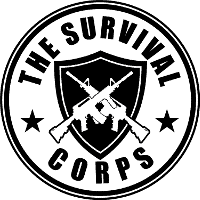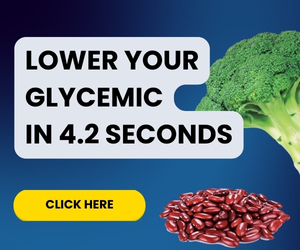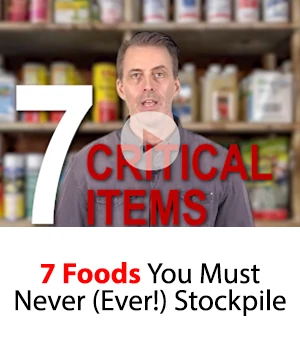While everyone should have a good bug out bag, you’ll also need something more portable to carry around every day. This is a small and basic kit for everyday emergencies in an urban environment, something that can easily fit in a fanny pack or small bag.
Mini First Aid Kit
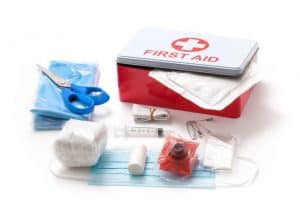
Wound dressing
Wound care supplies that you should have on hand in case of an injury, to properly treat a wound, are gauze sponges, gauze rolls, alcohol pads and medical tape.
EMT Shears
EMT Shears, or trauma shears, are a type of medical scissors for quickly and safely cutting clothes in case of an injury. Never use regular scissors for this, because medical ones are designed to slide across skin, without the risk causing an injury.
Antiseptic wipes
In case of a minor emergency, antiseptic wipes are very useful to have in your first aid kit, because they can safely clean and sterilize scrapes, cuts, wounds and abrasions. They properly sanitize the skin and kill germs.
Elastic bandage
An elastic bandage is just like the regular one, except it’s stretchable. It can help you localize pressure in case of a muscle sprain or strain, as it can reduce the blood flow to an injured area and prevent swelling.
Disposable gloves
Disposable gloves are the first thing to pack in your EDC first aid kit. They prevent cross-contamination, so they’ll protect you and the person you’re treating from getting germs and infecting yourself or a particular wound.
Small hand sanitizer
Using a hand sanitizer is very effective when there’s no soap and water to wash your hands, because it kills bacteria, viruses and other microorganisms more effectively.
Topical antibiotic ointment
A topical antibiotic ointment can be used to treat various skin infections, such as infected wounds and burns. You simply apply it directly to the skin, and it cleans the infections and helps them heal faster.
Pain medication like Ibuprofen
Pain relievers are vital for every first aid kit, because not only can they relieve pain and discomfort, but they can also reduce swelling. That’s why you should carry nonsteroidal anti-inflammatory drugs (NSAIDs), such as Ibuprofen.
Pepto-Bismol tabs
Pepto-Bismol are chewable tablets for digestive relief. They are great for easing an upset stomach and relieving diarrhea, heartburn, nausea and indigestion.
Band Aids
Band Aids are pretty obvious items to have in your first aid kit, as they are designed to cover and protect cuts, blisters, bruises and wounds and speed up their healing process.
Tweezers
Tweezers can be very useful when there’s something small in a wound or cut that you can’t extract with bare hands, such as splinters or glass. They’re also quite useful for extracting a bee sting.
Basic Tools
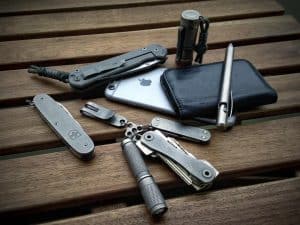
Multi-Tool (Swiss Army knife)
A multi-tool, or Swiss Army knife, is a Jack of all trades that you must have. This versatile pocket knife has many tools stowed inside the knife handle, such as a screwdriver, can opener, spearpoint blade, nail file, fish scaler, pruning blade, pliers, chisel, scissors and many others.
Lighter and matches
You need a lighter (or two) and matches in case you need to start a fire (BBQ, anyone?) or simply if you’re a smoker (smoking is bad, you know). A lighter is also great to have for sterilizing your first aid tweezers.
Whistle
If you find yourself in a critical, life-threatening situation when you need help, whether at home or outside, a loud whistle can help you get attention. Not only can you effectively signal for help, but you can also scare off criminals.
Small flashlight
Let there be light in case there’s a power outage or it’s dark outside and you simply need to see where you’re going. It’s also useful on a camping or hiking trip, or when you’re simply hanging out with your friends around a bonfire, as well as for signaling for help.
Portable phone charger
Your phone battery may die on you when you need it the most, so a portable phone charger can always save the day.
Emergency Items
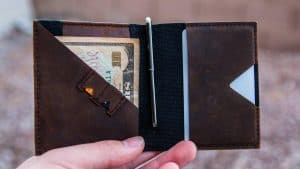
Spare batteries
A flashlight is of no use if its batteries die, so be sure to pack extra batteries in your EDC emergency kit. You can also use a portable solar panel to recharge your EDC items.
Water purification tablets
Water purification tablets effectively kill pathogens in water that can cause dysentery, typhoid and many other water-borne diseases. They typically have chlorine, chlorine dioxide and iodine, which deactivate contaminants and provide you with pure water safe for consumption, which is especially useful if you find a water source in the wild.
Portable raincoat
Since Mother Nature is one pretty unreliable lady, make sure you have a portable raincoat with you, which is packed so small that it can fit into your pocket.
Wet wipes
Wet wipes are great to have for your personal hygiene, as you can quickly clean your hands before and after snacks. They’re non-biodegradable, so make sure you dispose of them properly.
Emergency cash
Always carry some extra cash in your mini emergency kit – you never know when you might need it. You might need to use a pay phone, vending machine, get gas or a bus/train ticket, or check into a motel.
Magic marker
When you’re on the road, a magic marker could be useful for marking your route on a map or jotting down important notes. In case of a car accident, you can use it to jot down a license number of the other driver. Of course, you can always use a pen, which can come in handy for signing paperwork.
Salt and sugar packets
Need to improve food flavor? Check. Need to treat an open wound? Check. You can use sugar to treat wounds, because it is an excellent disinfectant that kills bacteria and speeds up healing. Salt can help you maintain a good electrolyte balance if you find yourself drinking a lot of water on a hot day.
Snacks (peanuts, dried fruit, protein bar)
If you find yourself someplace with no grocery stores, supermarkets or diners in the vicinity, the snacks you packed will definitely come in handy.
Instant coffee
If you’re a coffee lover, heading on the road without it can be frustrating, especially if you’re going to the great outdoors, so don’t forget to pack some instant coffee.
This mini EDC emergency kit is the one kit to rule them all. It has everything you’d ever need, so you can always be prepared for any kind of an emergency.
Pro tip: the first aid kit and snacks can go into separate zip-lock bags and you can have the compact tools right on top. Everything can fit in a small pocket bag and be thrown in a backpack or worn on its own over the shoulder.
